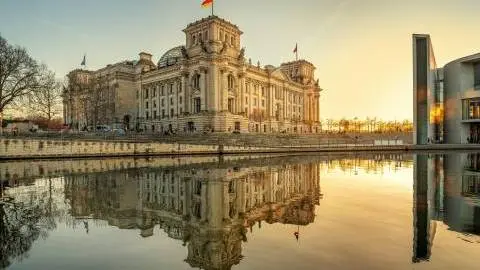German tv duel Scholz vs Merz ends with a draw
The first and only live tv debate between Olaf Scholz and Friedrich Merz is unlikely to significantly have moved the needle in the election campaign. Tone and content leave the door open for another grand coalition after the elections, even though coalition talks are likely to be complicated
The German election campaign has entered the last two weeks with a long-awaited tv duel of Chancellor Olaf Scholz and his main challenger Friedrich Merz. The tv debate has already been discussed controversially months ago when German public broadcasters, ARD and ZDF, had announced that the debate would only be between Scholz and Merz. Representatives of the Greens and the AfD criticised the exclusion of their candidates for chancellor, Robert Habeck and Alice Weidel, and called for a broader debate round. Indeed, today’s tv format was probably not the best representation of the current opinion polls, which see Merz’ CDU at 30%, the AfD at 20% and both the SPD and the Greens at 15%.
Well-behaved debate which leaves door open to another grand coalition
During the 90-minutes debate, both Scholz and Merz were able to present the well-known proposals from their respective election programs. In all honesty, even though it was called a duel, the tv format was not so much a duel but rather a relatively well-behaved presentation of both politicians’ views. While Scholz clearly tried to emphasise the positive results and achievements of the last three years, Friedrich Merz focused on stricter immigration and strengthening the economy. The underlying strategy of the campaign managers looks clear: Scholz tried to position himself as the experienced government leader who substantiated the achievements of his legacy with numbers. At the same time, Merz also tried to position himself as a reasonable statesman but solid alternative to Scholz.
As regards economic policies, the debate remained superficial and only brought an exchange of the well-known policy proposals. Proposals which follow in fact an almost stereotype distinction between centre-left and centre-right economic policies. Investment subsidies, tax hikes for the highest incomes and changes to the debt brake from Scholz; tax cuts for corporates and households, public expenditure cuts, sticking to the debt brake and hoping for the magic Laffer curve to bring in more tax revenues via higher growth.
The most remarkable comment came close to the end of the debate. When pressed by the journalists, Friedrich Merz opened the door to changes to the debt break; not immediately after the elections but at a later stage.
All in all, today’s tv debate is unlikely to significantly have moved the needle. First instant opinion polls also suggested a draw in the duel. Looking beyond the elections, today’s tv duel both in tone and content still leaves enough room for a cooperation (and possible coalition) between Merz and Scholz.
Complicated coalition talks likely
On 16 February, there will be another live tv debate, a four-way debate with again Scholz and Merz but also Habeck and Weidel. Together with today’s debate, another important milestone in an election campaign that has shifted between two topics: economics and immigration. It is also an election campaign which could end with as many as eight but also as little as four parties in parliament. An election campaign which could end with the far right AfD as second (or) largest party and an election campaign which might end with very complicated coalition talks. The fact that currently three political parties are close to the 5% representation household makes things more complicated. In or out for any (or all) of these three parties will have a significant impact on the coalition arithmetics.
All of this means that the next two weeks will bring more German election excitement.
This publication has been prepared by ING solely for information purposes irrespective of a particular user's means, financial situation or investment objectives. The information does not constitute investment recommendation, and nor is it investment, legal or tax advice or an offer or solicitation to purchase or sell any financial instrument. Read more
Download
Download article
9 February 2025
German election countdown 2025 This bundle contains 4 Articles